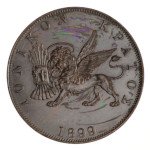The Establishment of the Ionian Republic
The Constantinople Conference of 1898
Due to its strategic location and complicated legal history, the future status of Corfu was by far the most contentious issue at the Constantinople peace conference of January 1898. Russia’s agenda was to soften for Greece the terms of the final treaty and to end all Ottoman occupation of Greek territory. The Ottomans had no delusions they would be able to retain any mainland territory nor any desire to do so; however, the Porte sought to retain permanent possession of Corfu, their legal argument based on the following four points:
- Greece’s violation of the perpetual neutrality mandated by Article II of the 1864 Treaty of London (Note 1) as a condition of the cession to Greece by Britain of the Ionian Islands had nullified Greece’s rights to Corfu, if not the entire archipelago.
- As Greece had been the aggressor in the war, and Ottoman occupation of Corfu had been necessary to stop attacks originating from the island, permanent possession was now required to prevent similar attacks in the future.
- A precedent for Ottoman sovereignty existed in the protectorate (The Septinsular Republic) established 1800 during the Napoleonic Wars after a joint Ottoman-Russian occupation of the island.
- In the 1864 treaty, the signatory powers (Great Britain, France, and Russia) declared the neutrality of Corfu, but provided for no guarantee; therefore, so long as the Ottoman Empire guaranteed and enforced Corfu’s neutrality, there would be no violation of any right nor obligation of any other Power.
The counter-response of the Russian delegation comprised the following three points:
- As guarantors of Greek independence, Great Britain, France, and Russia were practically responsible for the neutrality of Corfu, and rather than change the status of the island, Russia was willing to affirm this obligation in perpetuity by treaty in concert with Britain and France.
- Greek attacks on Albania had been launched by partisans with understandable sympathy for the plight of coreligionists under Turkish tyranny, but without the sanction or participation of the Greek government.
- As per long-standing precedent, it was impermissible for a land with an overwhelming Christian majority to be placed under the rule of a Muslim power.
The Ottoman delegate to the conference (Note 2) countered the Russian arguments point for point as summarized below:
- Regardless of the Powers’ obligations to Greece, they did not take action to preserve Corfu’s neutrality in the 1897 war, and the Porte could have no confidence that they would do so in the future, especially as the powers had also failed to keep their commitment to protect the integrity of the Ottoman Empire in 1877 per the Treaty of Paris of 1856.
- It was inconceivable that independent Corfiot partisans were capable of the scale of the attacks on Albania that had occurred without the cooperation and assistance of the Greek government and military. Furthermore, the population opposite Corfu was overwhelmingly Albanian and Muslim, and therefore the picture painted by the Russians was disingenuous at best.
- Russia herself was a signatory to the Treaty of Constantinople of 1800 which had established Ottoman sovereignty over the Septinsular Republic, so this point was inconsistent with Russia’s own past behavior.
Based on merit, the Ottoman position was rather obviously stronger, especially regarding the first two points. However, Legal arguments meant very little compared to the interests of the Powers, the positions of which are summarized below:
Britain opposed a change of the status of Corfu but hesitated to push on this subject for fear of upsetting the naval convention just signed by Britain and the Porte, which had greatly increased her influence in Constantinople at the expense of France and had strengthened the British strategic position in the Mediterranean and the Indian Ocean.
Italy publicly opposed Ottoman control, as to do otherwise would excite opinion at home; however, privately she supported it, perceiving an opportunity to reestablish her influence in Corfu, which would, in her view, result in the inevitable absorption of the island by Italy.
Austria-Hungary opposed a change of control for the very reasons Italy favored it, as Italian possession of Corfu would be a major strategic threat to the Habsburg position in the Adriatic as Italy would then control both sides of the entrance to that sea.
France generally opposed the transfer for similar reasons to Austria’s, but had more limited interest in the Adriatic, and feared further erosion of her position in Constantinople and the corresponding increase in British influence.
Germany had no objection to Ottoman sovereignty so long as the signatory Powers of the 1864 Treaty of London jointly guaranteed the island’s neutrality and the government of Corfu was strictly autonomous.
In the end, no power had the will for or interest in a military intervention, and the general assumption was that the island would inevitably (and likely soon) revolt against the new status quo and revert to Greece or come under the protectorate of the powers. In addition, so long as the neutrality of the island were enforced, the strategic difference between Ottoman or Greek control was negligible. And so the Ottoman Empire attained Corfu as a tributary state, formally styled the Ionian Republic.
Terms of the Treaty of Constantinople of 1898 pertaining to Corfu
- Corfu, including Paxos and other surrounding islets, would be an Ottoman tributary state in perpetuity, paying an annual sum of one lira to the Ottoman treasury.
- Corfu would establish its own legislative, executive, and judicial branches.(Note 3)
- Corfu was entitled to a gendarmerie battalion of no more than 300 men and three coast guard vessels, but no other standing military forces.
- Corfu was forbidden ever to reunite with Greece.
- Corfu would be represented diplomatically by the Ottoman foreign service but was entitled to establish consulates abroad.
- Corfu was subject to the Capitulations and bound by the treaties fixing tariffs, as well as by the rights of the Public Debt Administration.
- The Ottoman Empire was entitled to intervene to establish order and maintain Corfu’s neutrality, and the guaranteeing powers (Britain, France, and Russia) were entitled to intervene should the Ottomans fail to do so or should the Porte itself violate that neutrality.
- The Ottoman Empire would maintain no permanent garrison nor fortify the island in any way, and a high commissioner in the capital would be the sole representative of the Porte on Corfiote territory.
- Corfu would be entitled to its own flag and civil ensign, which was required to be distinct from the Greek flag. (Note 4)
- The Ionian Bank would have the exclusive issue of banknotes denominated in Ionian Obols, which would be reestablished as the currency of Corfu. (Note 5)
- The war indemnity would be reduced from £5M to £4M in compensation to Greece.
Impact of Ottoman rule and its reception by the Corfiotes
The cession to the Ottoman Empire was unsurprisingly ill-received on Corfu, resulting in protests and acts of resistance, and the Sultan’s gift to the island of a new theater house and a replacement for the Palace of St. Michael and St. George (which had burned in the war), (Note 6) as well as the refurbishment of several churches throughout the republic, made little headway toward reconciling the people to their new status. However, Greek nationalist sentiment, already milder than in the rest of Greece in the face of Corfu’s ancient particularism, more or less evaporated in substance once it became clear just how much lower taxes were under the Capitulations than had been levied by the Kingdom of Greece.
In particular, the uniform 1% import duty made almost all incoming goods significantly cheaper, and the 11% export duty made the predominant olive oil industry, previously burdened by 22.2%, far more profitable. The treasury of the Republic almost immediately accumulated a healthy surplus, rendering evident the extent to which Corfu’s revenues had been siphoned away by Athens (not least of which the annual subvention of £10,000 to the civil list of the king) for virtually no benefit to the island; even the excellent road system, the most useful legacy of the British protectorate, had been allowed to degrade.
Corfu had long been a favorite vacation destination and seasonal residence for the European elite, but under the Capitulations, Europeans were almost entirely tax-exempt, and this led to a substantial increase in the size of the expatriate population and a corresponding influx of money. Wilhelm II, Vittorio Emmanuel II, Elizabeth of Austria, Nicholas II, and Edward VII all maintained residences on the island, and the summer months produced enormous profits for Corfiote businesses as the nobility of Europe flocked to the island, augmented by the officers of the major fleets on call during their summer cruises. This, along with Corfu’s neutral status, made the island a major nexus of espionage and intrigue, particularly in times of high tension.
A considerable influx of Italians, particularly from Venetia and Dalmatia, resulted in a revival of the Veneto da mar as a prestige language of the Corfiote elite, and this trend was later reinforced by Dalmatian Italians escaping the assimilationist policies of independent Croatia.
Notes:
1. Excerpt from the 1864 Treaty of London:
Perpetual Neutrality of Ionian Islands.
ART. II. The Courts of Great Britain, France, and Russia, in their character of Guaranteeing Powers of Greece, declare, with the assent of the Courts of Austria and Prussia, that the Islands of Corfu and Paxo, as well as their Dependencies, shall, after their Union to the Hellenic Kingdom, enjoy the advantages of perpetual Neutrality.
Greece to maintain the Neutrality.
His Majesty the King of the Hellenes engages, on his part, to maintain such Neutrality.
2. Stephanos Mousouros Pasha, the incumbent Prince of Samos. His appointment as ambassador to the conference was widely regarded as a shrewd choice as his administration of Samos was notably successful and he was fluent in French, English, and Italian.
3. An indirectly elected Senate was established as the as the ultimate legislative and executive authority, and its president, the Archon, was the head of state. The concept of separation of powers was introduced with an independent judiciary.
4. A modified version of the flag of the old Septinsular Republic was adopted.

5. The sub-unit of the obol was the lepton, at 5 lepta to the obol. 500 oboli equaled one gold hyperpyron, commonly referred to as the bezant. The bezant was pegged to the Ottoman lira 1:1, and the two currencies were interchangeable. In fact, the shortage of smaller units of Ottoman coinage made the obol and lepton rather common currency in the western Balkans and even in North Africa.

6. Both buildings contributed by the Sultan, the civic palace and the theater, were designed by the Levantine Ottoman court architect Raimondo D’Aronco and remain masterpieces of Art Nouveau architecture. A third D’Aronco project, the Church of St. Mark, was paid for by leading Levantine families of Constantinople and a donation from the King of Italy.
The Sultan also financed establishment of the Ionian University in 1899, occupying the newly refurbished buildings of the old Ionian Academy, and the new institution soon became a leading European center for fine, applied, and language arts.



